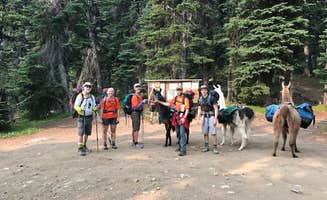Chiwawa Horse Campground is a specialized facility for horseback riders visiting the Wenatchee National Forest region near Stehekin, Washington. Located at an elevation of approximately 2,000 feet, the campground experiences warm summer days and cool nights typical of the eastern Cascades climate zone. The facility remains open from late May through early November, with trail conditions typically best during mid-summer months when snow has melted from higher elevation routes.
What to do
Trail riding through varied terrain: Riders can access multiple forest service roads directly from Chiwawa Horse Campground, creating opportunities for rides ranging from 2-15 miles depending on route selection. Jeff C. noted that "the campground was in good shape, nice and clean," providing a reliable base for daily riding excursions.
Alpine lake swimming: A 10-mile drive from the horse camp leads to Lake Wenatchee State Park Campground, offering a sandy swimming beach suitable for cooling off after trail rides. Gracie W. shared that it's a "great place to bring a bunch of friends, beautiful lake and beach and nice big camping spots!"
Backcountry exploration: For experienced riders seeking multi-day adventures, trails connect toward the more remote Junction Camp area. Jen M. describes the appeal: "Beautiful views of the glaciers... a strenuous hike up the mountain for about a mile," suggesting riders should prepare for elevation changes on certain routes.
What campers like
Convenient water access: The campground provides drinking water for both humans and horses, eliminating the need to haul water in large quantities. Campers at nearby Nason Creek Campground appreciate similar conveniences, with Garrett T. noting their site was "huge could fit lots of tents and hammocks... right on the river."
Clean facilities: Visitors consistently mention the well-maintained condition of the toilets and general cleanliness of the horse camping area. This matches experiences at other regional campgrounds, with Amanda E. sharing her experience at a nearby site: "The campground hosts were very friendly and there are flush toilets and running water as well."
Proximity to trails: Horse owners value the direct access to trails from the campground, reducing the need for loading and trailering between riding locations. Similar trail access is valued at dispersed sites like Upper Bobcat Dispersed Camping, where Emma noted: "Great spot with plenty of sites. Lots of room at your site and between neighbors. Super close to the river."
What you should know
Limited amenities: While Chiwawa Horse Camp provides basic needs, it lacks shower facilities, electrical hookups, and permanent horse corrals. Campers should bring portable corral systems or highline equipment for containing horses overnight.
Seasonal considerations: The campground typically opens Memorial Day weekend but trail access may be limited by snow at higher elevations until late June. Ann P. describes similar challenges at Harts Pass Campground: "We arrived July 1 and only two campsites were habitable due to snow."
Insect preparation: Summer months bring mosquitoes, particularly in early season. Pack appropriate repellent and protective clothing. PJ H. warned about a nearby camping area: "Was here last summer and the bugs were BAD, like hiding in the car and tent bad. Left with more bug bites than I could count."
Tips for camping with families
Beach day option: Families with children can take a day trip to Lake Wenatchee State Park, 20 miles south. Hailey T. recommends this option: "Amazing! Our spot faced the lake and surrounding mountains. The lake has such a nice beach!! Great swimming for adults and kiddos!"
Camp setup planning: Position portable corrals or highlines where they can be easily supervised from your main camping area. Consider bringing extra tarps for sun protection, as shade can be limited.
Trail selection for mixed riders: Choose lower elevation trails for inexperienced riders or children, saving the steeper terrain for adults. Madison S. noted similar terrain challenges on hiking trails: "The hike was a bit over 4 miles long over a slightly rocky terrain and some small patches of snow but overall wasn't too difficult."
Tips from RVers
Size restrictions: RVs over 25 feet may find the campground challenging to navigate. Laura M. describes a similar situation at nearby campgrounds: "20 ft max vehicle length, per sign at campground entrance."
Water and waste management: The campground has water for filling tanks but lacks dump stations. Plan your water usage accordingly and identify dump stations in nearby towns before departure.
Parking considerations: Position your trailer or RV to allow ample room for unloading horses and tacking up. Sites generally provide adequate space for a medium trailer and pickup combination but may not accommodate larger living-quarter trailers comfortably.


